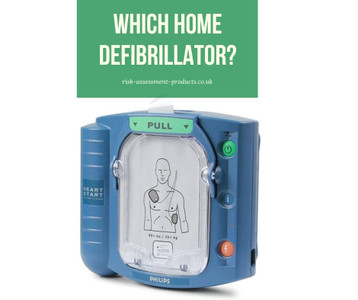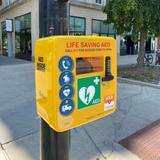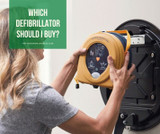Which home defibrillator?
80% of all out of hospital cardiac arrests occur at home. Defibrillators are often available in local communities, supermarkets, sports facilities and places of work but, not very often at home. Having a defibrillator at home gives thousands of people peace of mind. Whether themselves or a family member have a medical history of heart problems or, they would like a defibrillator for additional security, it’s a good idea to take a look around to weigh up your options and decide which is best for you.
When a cardiac arrest occurs, every minute that goes by without a defibrillator can reduce the chances of survival by up to 10% so, even if medical professionals are a matter of minutes away, it could still be fatal.
Home defibrillators will be of course, mostly stored indoors. This means you don’t need to worry about finding a defibrillator that is particularly repellent to water, dust and dirt. It’s a good idea to opt for a lightweight defibrillator so that you can easily transport it if going on journeys and want to take it with you.
Although all defibrillators are designed with ease of use in mind, defibrillator training is also a good idea but, not mandatory. Training will allow you to understand exactly what to do in an emergency however, defibrillators have audio and visual guides to direct you through the process meaning you have guidance throughout until the emergency services arrive.
Of course, cardiac arrests do not happen all of the time and if lucky, you won’t need to ever use your defibrillator but, the peace of mind in having one is really beneficial. With most community defibrillators or defibrillators stored in workplaces and supermarkets having a much higher footfall passing them every day, the chances that it would need to be used are of course much higher. As your defibrillator will remain at home however, this wouldn’t be the case.
A defibrillator with a long warranty means that you can have it for years at a time without needing to do much. Checks every now and again are required and it’s important to ensure that the defibrillator pads aren’t out of date but, most defibrillators have a long battery life meaning they can be ready to function for years without the need to change the battery.
There are some additional things to consider when it comes to purchasing a defibrillator for home use such as the cost. Defibrillators are certainly investment and with that comes somewhat of a price tag. The price range for a defibrillator usually starts at around £1,000. But, once you have one, they are really affordable to run.
We hope this information has helped you when it comes to searching for the most suitable home defibrillator. You can browse our entire range of defibrillators here or, get in touch for more information.
Recent Posts
-
Empowering Communities: The Lifesaving Impact of CPR on Restart a Heart Day
Every year, on and around October 16th, an important event takes place - Restart a Heart Day. This a …16th Oct 2023 -
Which home defibrillator?
80% of all out of hospital cardiac arrests occur at home. Defibrillators are often available in loca …4th Dec 2022 -
Which defibrillator should I buy?
There are many defibrillators available on the market and it can become overwhelming knowing which o …4th Nov 2022




